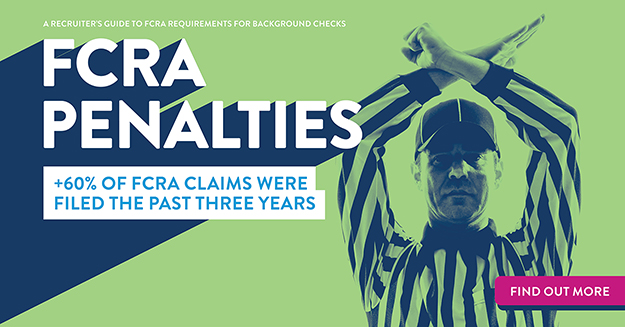A federal magistrate judge in the Northern District of California recently approved a class action settlement for $174,980 for alleged violation of the FCRA’s disclosure requirements. The defendant—a California-based company that provides outsourced cleaning and tool restoration services—allegedly violated the FCRA’s stand-alone requirement by including an extraneous liability waiver in their standard disclosure form. There were over 1,000 class members identified that are eligible to receive compensation.
Under section 604 of the Fair Credit Reporting Act (FCRA), an employer cannot procure a consumer report for employment purposes unless a “clear and conspicuous disclosure has been made in writing to the consumer” before the report is obtained. It must be “in a document that consists solely of the disclosure that a consumer report may be obtained for employment purposes”. The document must also authorize in writing the procurement of the consumer report.
According to the complaint, the plaintiff “contends that because the disclosure form included a liability waiver, in addition to a disclosure concerning a consumer report, the company violated the FCRA’s stand-alone disclosure requirement, and as a result, the company also never received proper authorizations for any reports it obtained using its standard [disclosure] form.” Furthermore, the plaintiff claimed that he “was confused by the standard disclosure and authorization form and did not understand that the company would be requesting a consumer report as defined in the FCRA.”
The court concluded that—in light of the clear statutory language that the disclosure document must consist ‘solely’ of the disclosure concerning a consumer report –the inclusion of a liability waiver is not permitted in the same document.
There has been extensive litigation regarding proper disclosure and authorization forms over the years and it continues to trend that way. As in this recent example, it is common for this litigation to focus on “extraneous” information included on the disclosure. In additional to mention of waiver of liability, other lawsuits determined that including information such as criminal history questions, mention that adverse action will be taken, including provision regarding the meaning of at will employment and incorporating a certification that the application materials were correct and complete could also be considered extraneous and violate the stand-alone requirement.
Given the rise in litigation regarding proper disclosure and authorization forms, we ultimately recommend you consult qualified legal counsel for final review.

Under section 604 of the Fair Credit Reporting Act (FCRA), an employer cannot procure a consumer report for employment purposes unless a “clear and conspicuous disclosure has been made in writing to the consumer” before the report is obtained. It must be “in a document that consists solely of the disclosure that a consumer report may be obtained for employment purposes”. The document must also authorize in writing the procurement of the consumer report.
According to the complaint, the plaintiff “contends that because the disclosure form included a liability waiver, in addition to a disclosure concerning a consumer report, the company violated the FCRA’s stand-alone disclosure requirement, and as a result, the company also never received proper authorizations for any reports it obtained using its standard [disclosure] form.” Furthermore, the plaintiff claimed that he “was confused by the standard disclosure and authorization form and did not understand that the company would be requesting a consumer report as defined in the FCRA.”
The court concluded that—in light of the clear statutory language that the disclosure document must consist ‘solely’ of the disclosure concerning a consumer report –the inclusion of a liability waiver is not permitted in the same document.
There has been extensive litigation regarding proper disclosure and authorization forms over the years and it continues to trend that way. As in this recent example, it is common for this litigation to focus on “extraneous” information included on the disclosure. In additional to mention of waiver of liability, other lawsuits determined that including information such as criminal history questions, mention that adverse action will be taken, including provision regarding the meaning of at will employment and incorporating a certification that the application materials were correct and complete could also be considered extraneous and violate the stand-alone requirement.
Given the rise in litigation regarding proper disclosure and authorization forms, we ultimately recommend you consult qualified legal counsel for final review.

